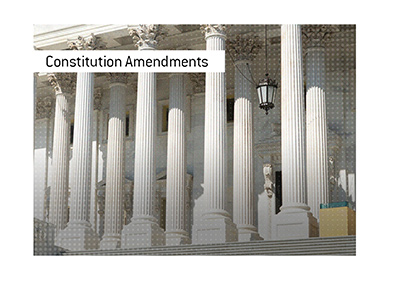A New Amendment Must Be Passed To Repeal An Old One
 How hard is it to remove an amendment from the Constitution? Does a sitting President have the power to repeal an amendment?
How hard is it to remove an amendment from the Constitution? Does a sitting President have the power to repeal an amendment?In most Presidential election cycles, we hear fear-mongering about how a Presidential candidate is going to repeal an Amendment if they get elected.
The truth is that the only way to repeal an amendment is to pass a new Amendment, and no one single person has the power to pass a new Amendment by themselves.
To see this in action, look at the 21st Amendment to the US Constitution, which repealed the 18th Amendment. This brought about the end of Prohibition in the United States.
-
An Amendment legally becomes part of the Constitution, so there is quite a process involved, as changes to the Constitution aren't taken lightly.
To start the process of passing a new amendment, the proposed amendment must be passed by a 2/3rds majority in BOTH the House and Senate.
After that, the proposed Amendment still isn't part of the Constitution, as the Amendment must be sent to all 50 states for a vote.
Each state has its own process of ratifying the vote, but the key point remains the same - in order to become part of the Constitution, a proposed amendment must receive Yea votes from 38 of the 50 states in order to become a Constitutional Amendment.
This means that 3/4ths of the US states must vote yea in order for the Amendment to become part of the Constitution. If not, it will fail.
There is a second way that an Amendment could be added to the Constitution, and this would involve 2/3rds of the US states calling a Convention to amend the Constitution. Again, this proposed Amendment would still have to be ratified by 75% of the country's State Legislatures.
-
There is a reason why Amendments don't get passed very often - it's very difficult to do.
The last Amendment to be ratified was the 27th Amendment (prohibits any law that increases or decreases salary for members of Congress from taking effect until after the next election of the House of Representatives has occurred), and this became part of the Constitution on May 5th, 1992.
-
US Presidents certainly don't have the power to repeal Amendments or create new ones by themselves.
Having said that, the US Supreme Court can issue rulings that interpret an Amendment (see District of Columbia v. Heller as an example).
Filed under: General Knowledge



